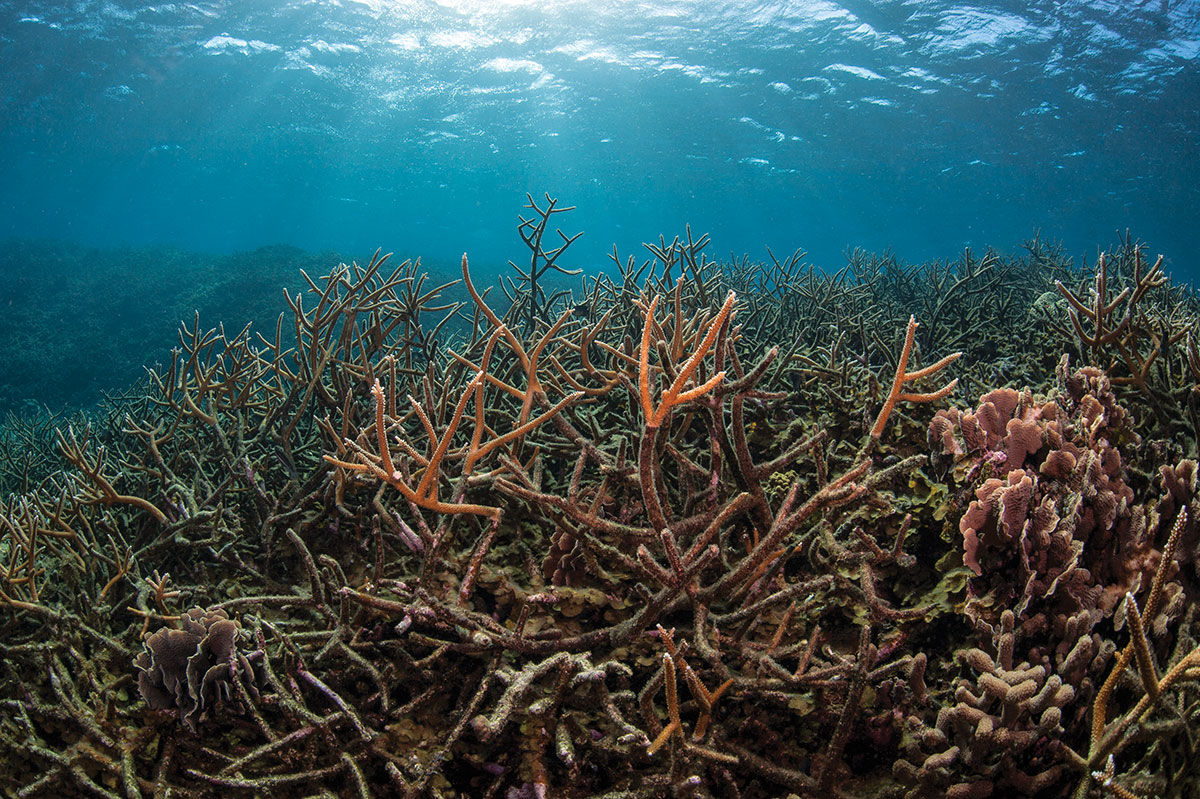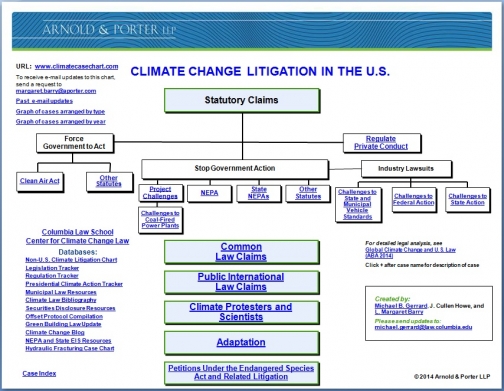
The advisory opinion request to the International Tribunal for the Law of the Sea (ITLOS) on State Parties’ obligations under the United Nations Convention on the Law of the Sea (UNCLOS, Convention) to prevent, reduce, and control pollution of the marine environment from climate change, and to protect and preserve the marine environment in relation to climate
change impacts raises critical legal questions. Despite the ongoing debate on whether ITLOS has jurisdiction to issue an advisory opinion on climate change, if the Tribunal asserts jurisdiction (on jurisdiction, see here and here), there is still much to uncover. The response to the questions posed by the Commission of Small Island States (COSIS) aims to define the regulatory framework applicable to the climate change regime at sea. Assuming the ITLOS will assert jurisdiction, this post’s objective is twofold. First, it discusses the relevant legal framework of the COSIS advisory opinion request. Second, it explains the link between climate change and UNCLOS by summarizing UNCLOS’ central provisions for the ITLOS to answer the questions raised.
Applicable Law to the ITLOS Advisory Opinion
The applicable law for the ITLOS advisory proceedings is determined by Article 293 of UNCLOS. Under this provision, an UNCLOS Court or Tribunal must apply the Convention and other rules of international law, including customary international law, not deemed incompatible with it when adjudicating legal issues under UNCLOS.
Additionally, ITLOS can also apply rules of reference, referred to as “generally recognized international rules and standards” or “global rules and standards,” which exist in other sources of law incorporated into UNCLOS by reference (see, e.g., Articles 207-2012 UNCLOS). These rules are, in effect, binding norms incorporated into UNCLOS. Consequently, the response to this advisory opinion request should consider the climate change regime set by the United Nations Framework Convention on Climate Change (UNFCCC) and the Paris Agreement (Paris Agreement) concerning the ocean. However, ITLOS is not responsible for implementing the UNFCCC or the Paris Agreement. Still, it can look to those instruments to define “international standards and global rules” to be applied in interpreting and enforcing UNCLOS.
Moreover, depending on the broader or narrower interpretation of the Tribunal’s jurisdiction under Article 21 of the ITLOS Statute, some questions may be outside its scope of jurisdiction. For example, issues of statehood and loss of territory due to sea level rise would arguably fall outside the Tribunal’s competence and could be addressed in the ICJ advisory request on climate change.
Content of the COSIS Advisory Opinion Question
The question posed by the COSIS in the advisory opinion request requires ITLOS to flesh out the climate change obligations of State Parties to UNCLOS. A key focus is on the Parties’ obligations under Part XII of UNCLOS, which deals with protecting the marine environment. In particular, the COSIS referred the following legal questions to ITLOS for an advisory opinion:
What are the specific obligations of State Parties to the UNCLOS, including under Part XII:
(a) to prevent, reduce and control pollution of the marine environment in relation to the deleterious effects that result or are likely to result from climate change, including through ocean warming and sea level rise, and ocean acidification, which are caused by anthropogenic greenhouse gas emissions into the atmosphere?
(b) to protect and preserve the marine environment in relation to climate change impacts, including ocean warming and sea level rise, and ocean acidification?
The question is divided into two parts.
The first part asks the Court to unpack the State Parties’ obligations to prevent, reduce, and control pollution of the marine environment “caused by anthropogenic greenhouse gas emissions into the atmosphere.” The second part concerns State Parties’ obligations to protect and preserve the marine environment from climate change impacts.
Both questions raise broader issues related to the interaction of the law of the sea’s regime with the international climate change regime and whether, when, and how one imposes limits on states’ actions under the other. For example, what are the rights and obligations of State Parties under UNCLOS concerning climate mitigation and adaption in the marine environment in light of the UNFCCC and Paris Agreement obligations? What are the potential liabilities of states and other actors for harm caused by climate change impacts on the oceans and marine ecosystems? What measures can be taken to promote international cooperation and coordination on climate change and its effects on the marine environment?
Below we flesh out the substantive content of the COSIS advisory opinion request. While not comprehensive, this section highlights obligations under Part XII of UNCLOS, which concern the three main identified climate change impacts on the ocean.
The Lost Link Between UNCLOS and Climate Change: Substantive Parts of the COSIS Advisory Opinion Questions
In 2019, the IPCC put into evidence the importance of the oceans in the climate change regime. This effectively brought climate change to the realm of UNCLOS, which does not expressly deal with the issue. Nevertheless, Part XII, on the protection of the marine environment, contains relevant provisions that can address climate in the oceans.
Greenhouse gas (GHG) emissions substantially affect the deterioration of the marine environment, causing ocean acidification, sea-level rise, and deoxygenation of the oceans. Many scholars have acknowledged the significant harmful effect of these substances in the marine environment and have argued that they are likely considered as “pollution” under the definition provided in Article 1(1)(4) of UNCLOS (see, e.g., here, here, here, here and here). Pollution refers to the introduction by man, directly or indirectly, of any substances or energy into the marine environment, leading to harmful effects on living resources and the marine environment. As such, since GHGs significantly harm the marine environment, they arguably fall within this definition and are subject to regulation under Part XII of the Convention on the Protection and Preservation of the Marine Environment. This will be one of the main questions addressed in the advisory opinion.
To interpret UNCLOS through the lens of climate change, we identify the relevant provisions in Part XII that the Tribunal can refer to when analyzing the questions in the present Advisory Opinion request.
The cross-cutting obligation to protect the marine environment under UNCLOS
Within Part XII of UNCLOS, Article 192 establishes the responsibility of States to protect and preserve the marine environment. This provision does not simply act as a general principle, but it is a specific obligation that states can invoke. The duty to protect the marine environment applies to all activities at sea. It is not limited to the obligations under Part XII or the provisions within the Convention. Instead, it is viewed as a cross-cutting principle that informs and guides all actions and decisions related to the marine environment. Therefore, this obligation should be interpreted according to the Paris Agreement, which highlights the importance of ensuring the integrity of all ecosystems, including the oceans (preamble). Similarly, Article 4(1)(d) of the UNFCC requires all State Parties to promote sustainable management, conservation, and enhancement of sinks and reservoirs of GHGs, including biomass, forests, oceans, and other ecosystems.
In the South China Sea Arbitration, the Tribunal explained the content of the obligation imposed by Article 192 UNCLOS. It noted that the article includes both positive and negative duties, meaning states must actively take measures to protect and preserve the marine environment and not degrade it. Furthermore, the obligations imposed by the article are informed and further detailed by subsequent provisions in Part XII of UNCLOS and other duties found in international agreements not incompatible with the Convention (South China Sea Arbitration, paras. 941, 942). For instance, a breach of the obligation to prevent pollution to the marine environment under Article 194 UNCLOS, or a breach of the obligation to promote the sustainable management of sinks and reservoirs of GHGs in the oceans under Article 4(1)(d) of the UNFCC, would, inter alia, imply a breach of Article 192 of UNCLOS. Accordingly, Article 192 arguably serves as an overarching obligation that includes several subordinate duties that ensure the protection of the marine environment. Consequently, violating either Article 192 or its subordinate duties will likely trigger State responsibility under UNCLOS, and all related obligations must be interpreted considering this comprehensive principle (South China Sea Arbitration, paras. 941, 942).
Below, this section will clarify the connection between climate change and UNCLOS, which is essential for ITLOS to address the related inquiries. It elaborates on the subordinate duties under Article 192 UNCLOS to achieve this. Specifically, it discusses how these subordinate duties under UNCLOS relate to climate change:
The Obligation to Prevent, Reduce, and Control Pollution to the Marine Environment and Prevent Transboundary Harm
Article 194 requires State Parties to take all the necessary measures to prevent, reduce and control marine environmental pollution from any source. Further, it also requires State Parties to avoid transboundary environmental harm derived from such pollution. This obligation includes the responsibility to notify other states of transboundary harm, set out in Article 198. Additionally, Articles 207 and 212, respectively, require States to adopt laws and regulations to prevent, reduce, and control the pollution of the marine environment derived from land-based sources and the atmosphere. Notably, Article 194 recognizes the importance of protecting the marine environment from the harmful effects of pollution, including pollution that may be caused by human activities that contribute to climate change, and sets out measures to address this issue.
The obligation of States to control polluting activities that occur within their jurisdiction affect the environment of other States and areas beyond national control has been recognized as customary international law in several cases (see, e.g., Pulp Mills, para. 139, and the South China Sea Arbitration paras. 941-942). Similarly, several authors have argued that this obligation predates the Convention, with UNCLOS simply codifying an existing customary law rule (e.g., Corfu Channel Case, p. 22). This view is supported by the recognition of this obligation in instruments that predate UNCLOS, such as Principle 21 of the Stockholm Declaration and the Trail Smelter Judgment, where the Tribunal noted that each “State owes at all times a duty to protect other States against injurious acts by individuals from within its jurisdiction.”
The Duty to Cooperate in the Prevention of Pollution of the Marine Environment
The duty to cooperate is a fundamental principle of international environmental governance and a crucial obligation concerning climate change, particularly for protecting common spaces such as the marine environment. The duty is enshrined in several international instruments, including Principle 24 of the Stockholm Declaration, Principles 7 and 27 of the Rio Declaration, Articles 3.5, 4.1(c),(d),(e),(g),(h),(i) of the UNFCC, Articles 7.6, 7.7, 8.3, 8.4, 12 of the Paris Agreement, among others. Furthermore, UNCLOS codifies this customary obligation in Article 197. In addition, ITLOS has reiterated the duty to cooperate in several cases, such as the Mox Plant Case (para. 82) and the Land Reclamation in and around the Straits of Johor Case (para. 92), emphasizing its fundamental nature in preventing pollution and preserving the marine environment.
From a legal standpoint, the duty to cooperate is strongly related to climate mitigation policies as they promote global governance and international cooperation. Moreover, as noted by the IPCC, the effective mitigation of climate change is a global problem that requires collective action, including international cooperation. In this context, some scholars have argued that the obligation to cooperate includes the obligation to mitigate and vice versa. ITLOS may weigh in on this in its advisory opinion. ITLOS might also be expected to consider whether the duty to cooperate in preventing pollution of the marine environment encompasses solely procedural obligations like the duty to inform of transboundary harm or includes substantive responsibilities such as assisting developing countries to enhance their capacity to prevent and mitigate climate change.
Obligation to Use the Precautionary Approach in Protecting the Marine Environment
The precautionary approach is a fundamental principle of international environmental law. It requires parties to take precautionary measures to prevent serious environmental harm, even when scientific evidence is uncertain or incomplete. The principle has been recognized in various international instruments, including Article 11 of the World Charter for Nature and Principle 15 of the Rio Declaration. In the Southern Bluefin Tuna case, ITLOS confirmed the importance of the precautionary approach by ordering parties to act with prudence and caution to prevent serious harm to southern bluefin tuna stock (paras. 77-80). However, in the Mox Plant case, the Tribunal seemed to limit the application of the precautionary approach by suggesting that it should only be used in cases of irreparable damage to the rights of a nation or serious harm to the marine environment (para. 75).
Despite this limitation, Judge Wolfrum noted in his separate opinion that the precautionary approach is enshrined in Article 194(2) of UNCLOS as customary international law (p. 133). This recognition of the precautionary principle in shared common spaces as customary international law is significant because it reinforces the obligation of states to take precautionary measures to prevent harm to the environment, even in cases where scientific evidence is uncertain.
At the core of the question presented to ITLOS is what constitutes a precautionary approach in the context of States’ obligations to prevent, reduce, and control pollution of the marine environment caused by anthropogenic GHG emissions. For example, how will the findings of the IPCC inform the establishment of a precautionary approach? And how do these translate into limitations to the rights of states?
Obligation to conduct environmental impact assessments
Environmental protection requires an assessment of the potential risks that any human activity could have on the environment. UNCLOS reinforces this obligation, particularly for the marine environment. Article 206 of UNCLOS explicitly requires states to conduct environmental impact assessments (EIA) when there are reasonable grounds to believe that activities under their jurisdiction or control may cause substantial pollution or significant and harmful changes to the marine environment. Case law has supported this obligation (i.e., Pulp Mills Case, para. 204). The ITLOS Seabed Disputes Chamber noted that carrying out an EIA is a general obligation under customary international law (Area Advisory Opinion, para. 145). Similarly, the South China Sea Arbitration Tribunal cited this precedent and reinforced the duty to assess activities with potentially damaging effects on the environment (para. 948). Conducting an EIA is critical to ensuring that human activities do not harm the environment, particularly in shared and transboundary contexts.
However, the duty to conduct an EIA cannot be limited to activities undertaken at sea. Arguably, if land-based activities are GHG emitting and have the potential of further contributing to the degradation of the marine environment, they must be subject to an EIA studying the downstream impact of that activity in the marine environment. Conducting an expansive interpretation of the Convention, arts. 207 and 212 UNCLOS would support the idea that State Parties must adopt laws and regulations to prevent, reduce and control marine environment pollution derived from land-based sources and from or through the atmosphere. This would arguably include conducting EIAs of land-based activities that are GHG emitting.
Obligation to Protect the Marine Environment in the Area as an Erga Omnes Obligation
In addressing the current advisory opinion request, the Tribunal needs to examine the legal regime of the Area as defined by UNCLOS. The Area includes “the seabed and ocean floor and subsoil thereof, beyond the limits of national jurisdiction” (Article 1(1)(1)), and it is part of the “common heritage of mankind” (Article 136 UNCLOS). The “common heritage of mankind” refers to community interests of humankind beyond national jurisdiction – res communis – that prevail over national interests, and the international community has a shared obligation to act as trustees over these shared interests, including an enhanced commitment to protect the marine environment in this zone.
Furthermore, it is crucial to consider the relationship between the “common concern of humankind” to prevent climate change and the “common heritage of mankind.” The UNFCC recognizes climate change as a common concern of humankind, and this concept complements the common heritage of mankind. Both concepts emphasize the importance of protecting common humanity interests and values, and they share a common root in natural law, which grants them a universal character, thus, reinforcing the interests of the international community as a whole.
In the Area Advisory Opinion, the Seabed Chamber identified several obligations of states in the Area, including a rigorous application of the precautionary approach, using best environmental practices, ensuring the availability of recourse for compensation for damage caused by pollution, and conducting environmental impact assessments. (paras. 120-122) These obligations are erga omnes, meaning that they are owed to the international community as a whole. (para. 180). The Chamber also noted that the ISA is entitled to act on behalf of “mankind” when protecting the environment in the Area. This means that states or the ISA can claim compensation considering the erga omnes character of the obligations relating to the protection of the environment in the Area (para. 180).
In this context, in answering the present advisory opinion request, the Tribunal should consider the legal regime of the Area, the relationship between the common concern of humankind and the common heritage of mankind, and the possible implications of breaching erga omnes obligations to prevent and mitigate climate change in the Area.
Conclusion
Advisory opinions do not settle disputes or create legal obligations but carry significant legal weight and moral authority to clarify and advance international law. The questions posed by the COSIS require ITLOS to flesh out the duties that State Parties have under UNCLOS concerning climate change, particularly under Part XII on the protection of the marine environment. How ITLOS does this will depend on the applicable law. While Article 263 of UNCLOS is not a grant of jurisdiction, it allows the Tribunal to borrow international standards and rules to interpret UNCLOS and to clarify State Parties’ obligations concerning climate change. Questions concerning sea-level rise and statehood, among others, will likely be left out of the present advisory opinion, leaving room for the ICJ advisory opinion request on climate change to complement the ITLOS advisory opinion. In any case, the ITLOS advisory opinion has the potential to define the regulatory framework applicable to the climate change regime at sea, and the Tribunal’s answer will create a precedent on how the other international courts and tribunals will address the ongoing advisory opinion requests.




